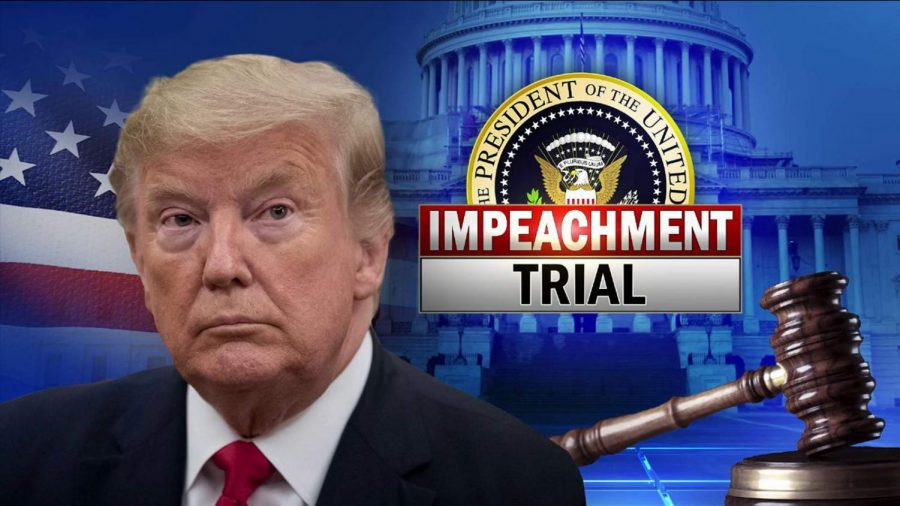Inside the Impeachment
President Donald Trump is currently the third president to be impeached in American history by the United States House of Representatives.
Washington D.C. has been a flurry of activity as the impeachment trial for Donald Trump gets underway, leaving both Democrats and Republicans tense. After being impeached by a House majority on the charges of obstruction of Congress and abuse of power in December, Donald Trump has become the third president to be impeached. Trump is accused of withholding funds from Ukraine in an attempt to gain leverage in the 2020 election. The funds in question are a roughly 391 million dollar military-aid package approved by Congress, allegedly held to pressure Ukraine into investigating Joe Biden- currently a 2020 Democratic presidential candidate- and his son Hunter Biden, who worked for a Ukranian company at the time.
So what does impeachment mean? It is crucial to note that impeachment does not mean eviction from office. The House is given the authorization to approve articles of impeachment with a majority vote. However, the impeachment must then be tried in the Senate. Senators will hear cases both for and against the authority figure in question. At the end of the proceedings, Senators vote on whether the individual should be convicted of the impeachment articles. If two-thirds of the Senate agree with the charges, the individual is removed from office. The Senate can also choose to prohibit the convicted official from holding any future office with an additional majority vote. The impeachment process isn’t exclusive to presidents either- Federal judges, a Senator, and a Cabinet member have all gone through the impeachment process, but only Federal judges have ever been convicted.
Seven Democrat House managers have been tasked with organizing and executing the argument against Trump by Speaker of the House Nancy Pelosi. They are led by Adam B. Schiff, a Democrat and Representative of California. Trump is defended by his legal team. Each group receives 24 hours to present their opening arguments, and there is an additional 16 hours where the floor is open to questions from the Senators.
Here’s a timeline of the general events of the impeachment and the trial:
July 25, 2019– Call between Donald Trump and Volodymyr Zelensky, President of Ukraine. The call is a crucial element of the impeachment charges, as House managers argue that Trump’s intentions were to gain leverage in the upcoming Presidential election.
September, 2019 – An anonymous whistleblower begins to voice concerns about the President’s relationship with Ukraine, eventually citing the call as evidence of a pressure campaign.
September 24, 2019– Speaker of the House Nancy Pelosi announces the House will launch a formal impeachment inquiry against the President.
Wednesday, Dec. 18, 2019– House of Representatives passes two articles of impeachment charging President Trump- one for obstruction on Congress, the other for abuse of power.
Wednesday, Jan. 22- Day one of the impeachment trial, as the House Managers begin to make their case. They speak to the Senate and request that they decide for the good of the country over loyalty to a party, likely searching to earn Republican votes in the Senate.
Thursday, Jan. 23– House impeachment managers focus on the abuse of power charge, arguing that the President should be removed for the pressure he put on Ukraine. They also brought up his relationship with Russia, a connection that has been notoriously questioned, and proposed that his interference with Ukraine, Russia’s adversary, may have been motivated by this connection. They also argue that Trump’s investigations into the Bidens were baseless.
Friday, Jan. 24– Democrats argue for obstruction of Congress, arguing that Trump refused to let members of the Trump administration testify during the House’s investigation and ignored requests for documents. They also point towards tweets from Trump condoning the “whistleblower” and people who testified during the impeachment inquiry, calling his language “witness intimidation”.
Saturday, Jan. 25– The A total of 28,578 pages of evidence supporting the House’s decision to impeach were delivered to the Senate. Trump’s defense team makes their case, their central argument being that witnesses speaking on Trump’s actions and plans could have no definitive knowledge of Donald Trump’s intentions in his discussion with Ukraine. Some Senate Democrats argue that this perspective chosen by the defense team is actually beneficial for their side, as Democrats are pushing the case for more witnesses to solidify Trump’s intentions. Democratic Senator Richard Blumenthal says that Senate Democrats intend to use all 16 hours of questioning time next week.
Sunday, Jan. 26– the trial takes a break, and resumes starting the following day.
Donald Trump took to Twitter to express his feelings of outrage about the proceedings, calling the impeachment charges “partisan” and a “hoax”. He also expressed his resounding belief that he has been treated unfairly throughout the process.
The proceedings will resume on Monday and Tuesday.












